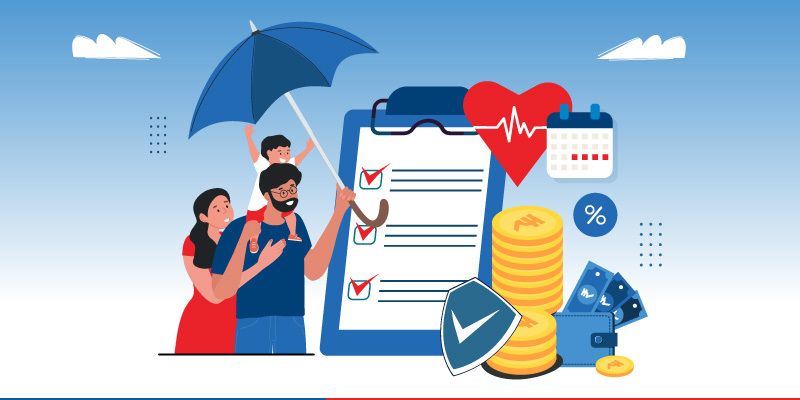What do you want to do?
What is Financial Wellbeing?

Table of Content
Being financially secure and in control of your finances is financial well being meaning. The definition also differs with age. Youngsters consider financial well-being as financial empowerment, and older adults consider it as being financially independent in retirement and planning for the financial security of their families.
In brief, financial wellbeing is about how to make the most of your money. It is your ability to control your finances, avoid unnecessary expenses, develop savings discipline, and invest smartly to create a sufficient corpus for your financial goals while working toward financial freedom. Achieving financial wellbeing means setting clear goals, creating a budget to make room for investments aligned with these goals, and building a strategy to attain financial freedom. By investing in various assets that suit your risk appetite and reviewing your investments regularly, you can adapt to changing market conditions and stay prepared for unforeseen expenses, ensuring long-term financial stability and freedom.
Benefits of Financial Wellbeing
Having understood the financial well being meaning, you should work towards boosting and deriving the benefits which are:
Reduced Stress and Anxiety
Increases Financial Security
Achieving Financial Goals
Better Retirement Planning
When your finances are in control, you do not have to worry about unexpected expenses, managing debts, arranging funds for major events in life such as children’s education, planning their marriage, medical emergencies, etc. With financial stability, you have peace of mind as you are not anxious or stressed about unpaid bills, debts, and forthcoming financial burdens.
Financial well being meaning is being able to manage your finances responsibly and feeling financially secures. You will have control over your finances and can decide what to spend on and what to eliminate. With financial resources, you can handle adverse financial situations, manage bills and debts, and invest for the present and future goals.
When you are working towards financial wellbeing, you have a financial plan that helps in achieving your financial goals. The steps in financial planning enable you to create a structured approach to achieve your economic objectives. Prudent financial planning considers factors like market volatility and inflation to predict the likelihood of achieving your goals. It also outlines an investment plan that leads toward wealth building, ensuring progress towards both short-term and long-term goals.
After knowing what financial wellbeing is, you should also know how to work towards it. Financial planning helps you strategically work towards improving your economic wellbeing. One of the advantages of financial planning is a better retirement plan.
With smart budgeting, which is an integral part of financial planning, you can create disposable income and deploy it to secure your financial future through an investment plan. It helps you plan your retirement with investments in long-term and safe financial tools such as PPF, NPS, EPF, etc. The compounding effect in these assets helps create a corpus for financial independence at retirement.
Key Components of Financial Wellbeing
For a larger perspective of what is financial wellbeing, you should be aware of the key components of financial well-being. Focusing on these elements culminates in long-term financial success. They are:
Budgeting and Managing Expenses
Saving and Investing for the Future
Managing Debt and Credit
Planning for Emergencies
Watch Your Credit Score
Budgeting and managing expenses are crucial for financial fitness and to achieve goals set for every stage of life. It could be creating an emergency fund, planning for your child’s education, buying a house, insurance planning, or retirement planning.
For efficient budgeting, you have to track your daily and monthly expenditures. Categorise the expenses, strike out the unnecessary ones, and create room for investments.
It is important to prioritise savings for robust financial wellbeing. Learn to start saving early so that you have enough time to learn from your mistakes and fine-tune your investment skills. Your savings should be well utilised for short-term goals like building an emergency fund to manage unforeseen expenses and bounce back, as well as long-term goals such as a retirement plan.
The main element of financial literacy is credit and debt management. Strategic financial planning plays a key role in using credit responsibly, understanding the implications of debts, and creating a plan for a debt-free future, all of which accelerate your progress towards financial wellbeing. Effective credit management through strategic financial planning will improve your credit scores and increase your access to loan opportunities.
A broken gadget, an unexpected medical emergency, or income loss are some financial emergencies that can rattle your budget. Setting aside a fixed amount in a high-yield savings account with high liquidity will keep you prepared for these unplanned expenses.
Keep a close watch on your credit scores. A good credit score will open opportunities for loans with competitive interest rates. The scope for higher loan and credit card limits at competitive rates are perks of a good credit score. A low credit score means a higher interest rate that can harm your budget and limit your investing resources.
How to Improve Your Financial Wellbeing?
Financial wellbeing is not only about developing spending control. It involves planning and working on various elements. Some of the mandatory aspects you need to work on are:
Creating a Budget
Building An Emergency Fund
Reducing and Managing Debt
Setting Realistic Financial Goals
After a financial health assessment, you should devise a strategy to strengthen it. Creating a budget is the initial step. Track your expenses and compare them with your income. If not overspending, your expenses may drain your entire income, leaving no scope for savings.
In such instances, you have to categorise your expenses and eliminate the ones that seem impulsive and unnecessary. You should also plan to clear high-interest debts like credit card dues, personal loans, etc., to have enough to set aside for savings. Whenever there is income growth, you should revisit your budget and tweak it to make more room for saving and investing.
Financial wellness is being prepared for unplanned expenses and feeling monetarily secure. Allocate a part of your income to savings. Park them in a high-yield savings account with high so that the funds yield returns when it is not in use. An emergency fund gives you peace of mind and allows you to handle unexpected events without stressing your budget.
Reducing and managing debt is crucial in maintaining financial wellbeing. Paying up debts on time avoids penalties and excessive interest costs. It reduces the risk of default and helps maintain a healthy credit score. Gradual debt reduction enhances the financial resources needed to invest and create wealth over time.
Financial planning begins with setting personal financial goals. Define long term and short term financial goals. Assess your current financial status and select attainable goals. Set timelines for the goals. Prioritise them and create an investment plan to build a corpus to achieve these goals. Review your investment portfolio and adjust it according to changing goals, financial situation, and market conditions.
Conclusion
Financial wellbeing is often mistaken for financial health. While financial health is about how much corpus you have built and the bank balance, financial well-being is about your capability to honour financial obligations, meet everyday expenses, be prepared for unplanned expenses and secure your future.
Focussing on key elements such as setting financial goals, creating a budget, building an emergency fund, investing for the future, and reviewing and adjusting your investment portfolio will lead you to financial well-being. If the procedure is overwhelming and your investment skills are limited, you can attend a financial wellness programs and learn to manage your income and expenses efficiently.
FAQs on Financial Wellbeing
Q. What is financial wellbeing?
Financial wellbeing is your ability to work within your income and set aside some amount for savings. This depends on how adept you are at managing your spending and differentiating between spending on what you like, unwanted expenses, and mandatory expenses. A thoughtful approach to financial investment is essential for securing your future and ensuring your savings grow effectively. You should also be able to honor your financial obligations, manage debts to avoid penalties, and maintain long-term stability through smart financial planning.
Q. What is personal financial wellbeing?
Personal financial well-being is about managing personal finance effectively, maintaining control over your financial resources, being prepared for unexpected expenses, and staying on track to achieve a secure financial future. It encompasses financial resilience and empowerment. Individuals with strong personal finance management experience reduced economic stress and greater financial stability
Q. What is the objective of financial well-being?
The objective of financial well-being is the ability to have control over finances and manage your money responsibly to achieve financial goals. It includes meeting financial obligations, being prepared for emergencies, being able to spend for what you like, such as planning a holiday, saving for the future, and feeling financially secure.
Q. What are the main components of financial well-being?
The main components of financial well-being are budgeting and managing finances, planning for emergencies, managing debt and credit, planning for the future, and watching the credit score.
Q. How does financial well-being relate to mental health?
Financial problems can trigger stress and anxiety. Being disturbed about pending bills and EMIs leads to sleep problems. The insecurity impacts social life and relationships.
Related Articles:
- What is Financial Planning? Definition, Benefits and Purpose
- Importance of Financial Planning
- Financial Planning and Wealth Management
References:
1. https://www.forbes.com/sites/lizfrazierpeck/2022/01/19/financial-wellness-is-critical-to-your-overall-healthand-financial-literacy-is-the-key/
2. https://www.investopedia.com/terms/f/financial-literacy.asp

Not sure which insurance to buy?
Talk to an
Advisor right away
Advisor right away

We help you to choose best insurance plan based on your needs
Here's all you should know about life insurance.
We help you to make informed insurance decisions for a lifetime.
HDFC Life
Reviewed by Life Insurance Experts
HDFC LIFE IS A TRUSTED LIFE INSURANCE PARTNER
We at HDFC Life are committed to offer innovative products and services that enable individuals live a ‘Life of Pride’. For over two decades we have been providing life insurance plans - protection, pension, savings, investment, annuity and health.

Popular Searches
- term insurance plan
- savings plan
- ulip plan
- retirement plans
- health plans
- child insurance plans
- group insurance plans
- personal accident insurance
- saral jeevan bima yojana
- income tax calculator
- pension calculator
- bmi calculator
- compound interest calculator
- income tax
- tax saving investement options
- best investment plans
- benefits of term insurance calculator
- what is term insurance
- why to invest in life insurance
- Ulip Vs Mutual Fund
- tax planning for salaried employees
- how to choose best child insurance plan
- Retirement Planning
- 1 crore term insurance
- HRA Calculator
- term insurance plan
- life insurance
- life insurance policy
Note: This material has been prepared for information purposes only, should not be relied on for financial advice. You should consult your own financial advisor for any financial matter.
18. Save 46,800 on taxes if the insurance premium amount is Rs.1.5 lakh per annum and you are a Regular Individual, Fall under 30% income tax slab having taxable income less than Rs. 50 lakh and Opt for Old tax regime.
ARN - DM/12/24/19748




